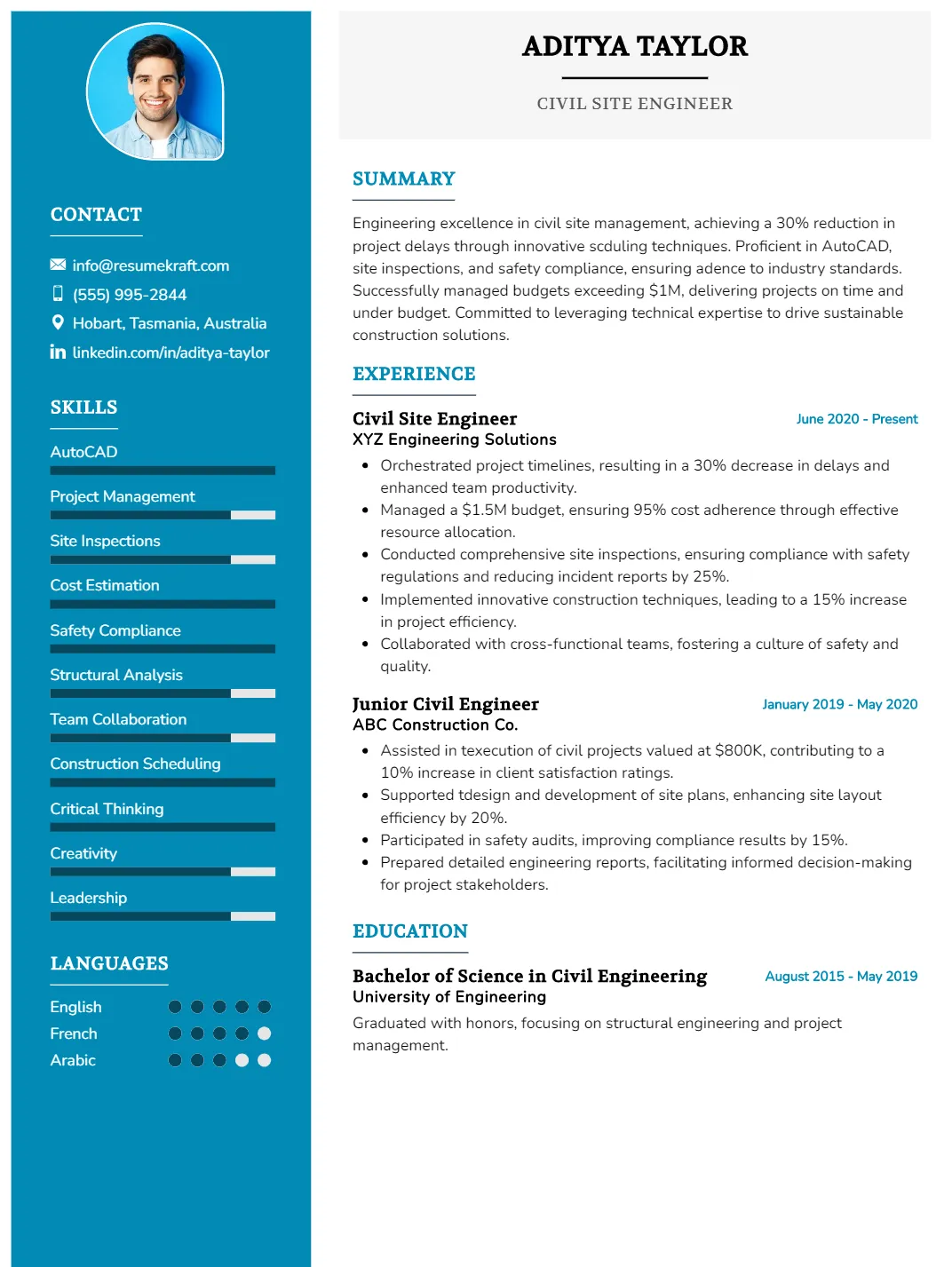
The role of a Site Engineer is pivotal in the construction and engineering industry, acting as the vital link between the design office and the construction site. Site Engineers are responsible for overseeing construction processes, ensuring safety compliance, and maintaining quality standards, which makes them essential in delivering successful projects. In today’s competitive job market, the demand for skilled Site Engineers continues to rise as infrastructure development accelerates globally. This article aims to provide insights into crafting an effective resume tailored for Site Engineers, highlighting key skills and experiences that can enhance job prospects.
- Site Engineer resume examples
- How to format a Site Engineer resume
- How to write your Site Engineer resume experience
- How to list your hard skills and soft skills on your resume
- How to list your certifications and education on your resume
- How to write your Site Engineer resume summary or objective
- Additional sections for a Site Engineer resume
- Key takeaways for writing a professional Site Engineer resume
- Frequently Asked Questions
Site Engineer resume examples
Site Engineer resume examples serve as valuable tools for job seekers looking to showcase their skills and experiences effectively. By examining these examples, candidates can gain insights into the specific qualifications and accomplishments that hiring managers seek in this role. Understanding the structure and language used in successful resumes helps applicants craft compelling documents that highlight their expertise in site management and engineering principles.
Site Engineer Resume
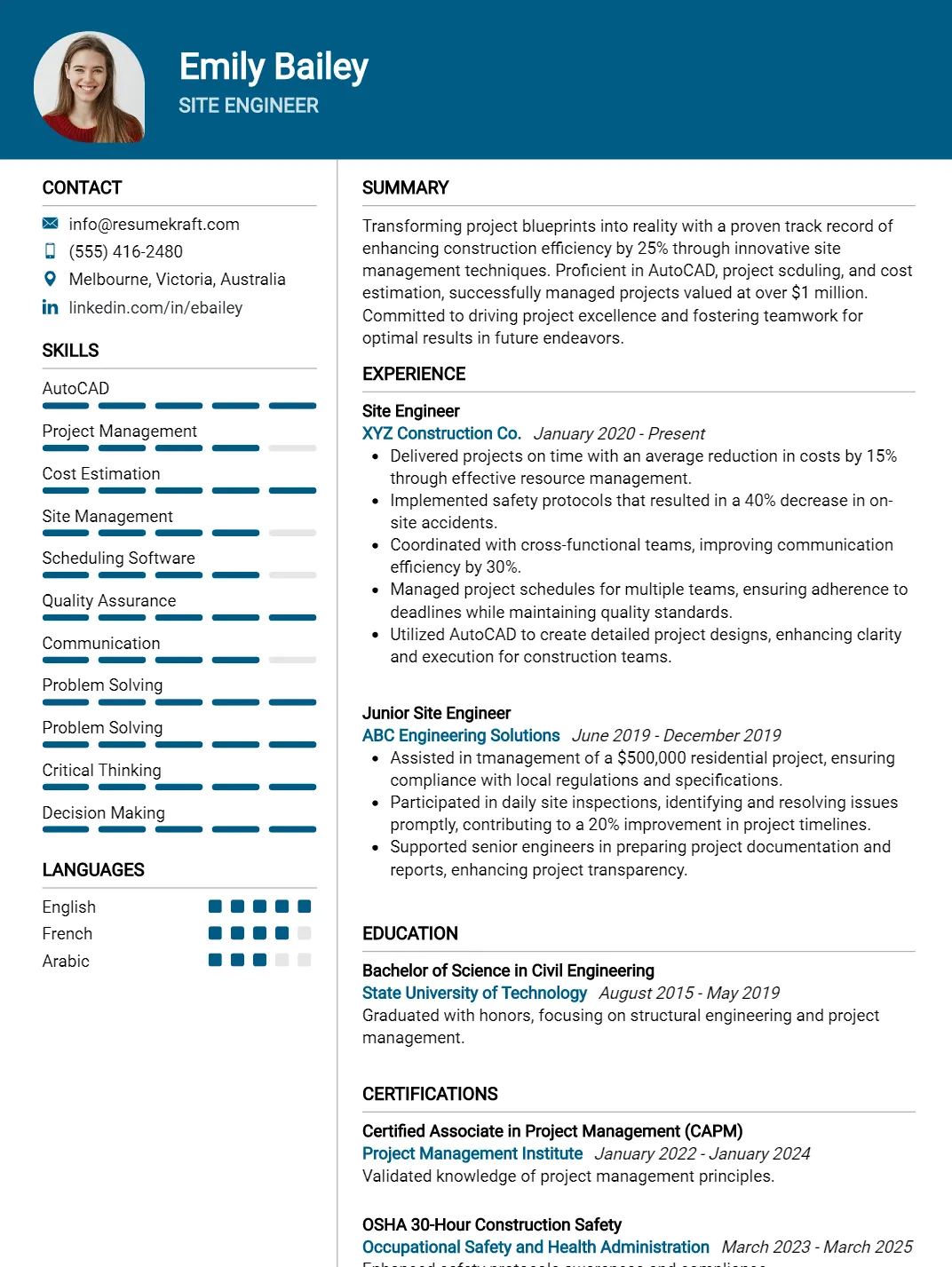
Why This Resume Works
This resume effectively positions the candidate for a Site Engineer role by highlighting relevant skills such as AutoCAD, project management, and cost estimation, which are crucial in this field. The structured format enhances readability, allowing hiring managers to quickly assess qualifications. It likely includes keywords aligned with ATS requirements, ensuring compatibility with industry standards. Additionally, the strategic presentation of achievements demonstrates practical experience and successful project outcomes, making the candidate stand out among peers and appealing to employers seeking proven expertise in site management.
Junior Site Engineer Resume
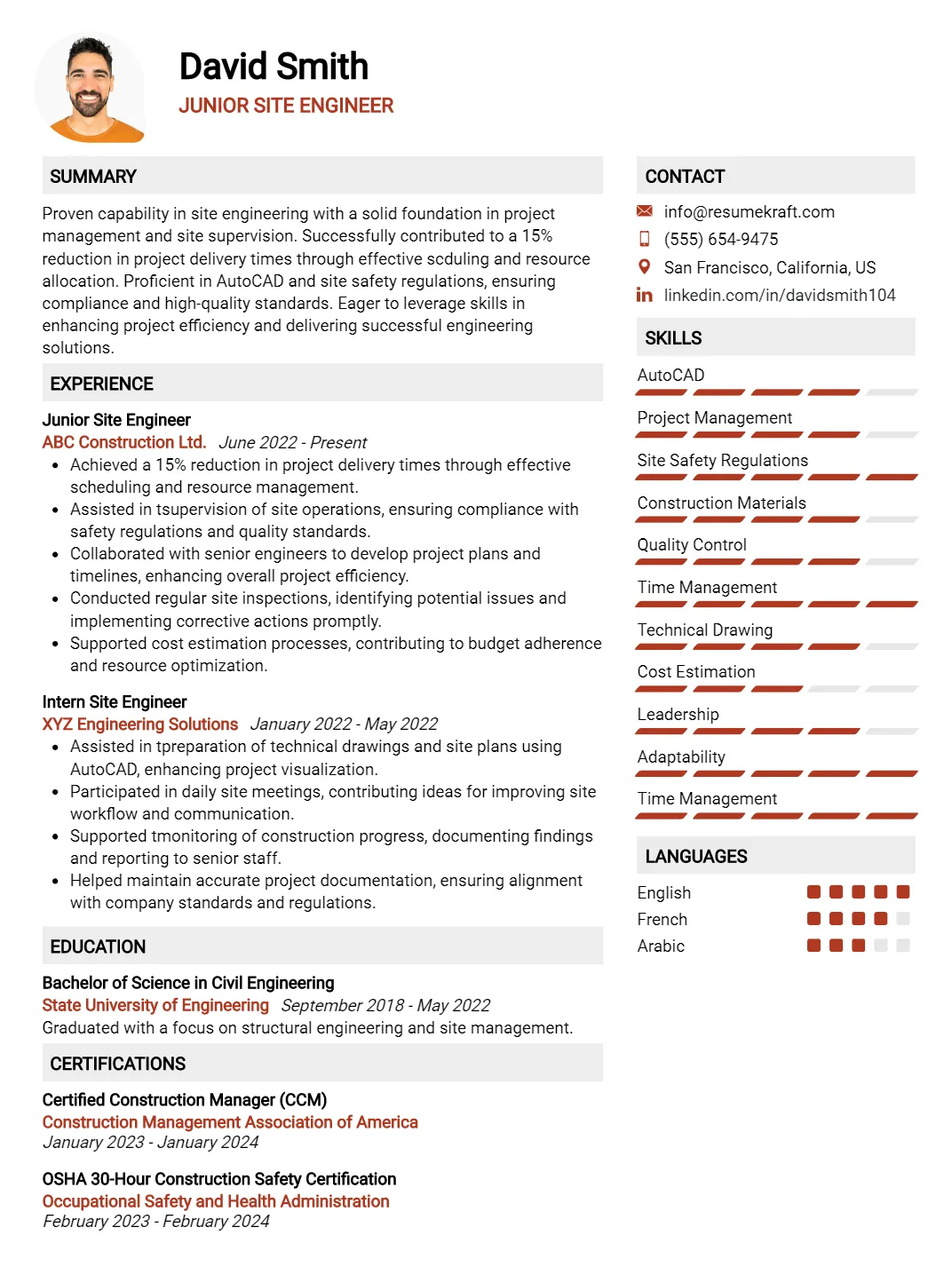
Why This Resume Works
This resume effectively highlights the candidate’s relevant skills, such as AutoCAD and project management, which are crucial for a Junior Site Engineer role. With approximately three years of experience in both junior and intern positions, it showcases a solid foundation in site safety regulations and quality control. The structured format ensures clarity and easy navigation, enhancing ATS compatibility by using industry-specific keywords. Additionally, strategic presentation of achievements demonstrates practical expertise that aligns with the demands of construction projects, making this resume particularly compelling for employers.
Senior Site Engineer Resume
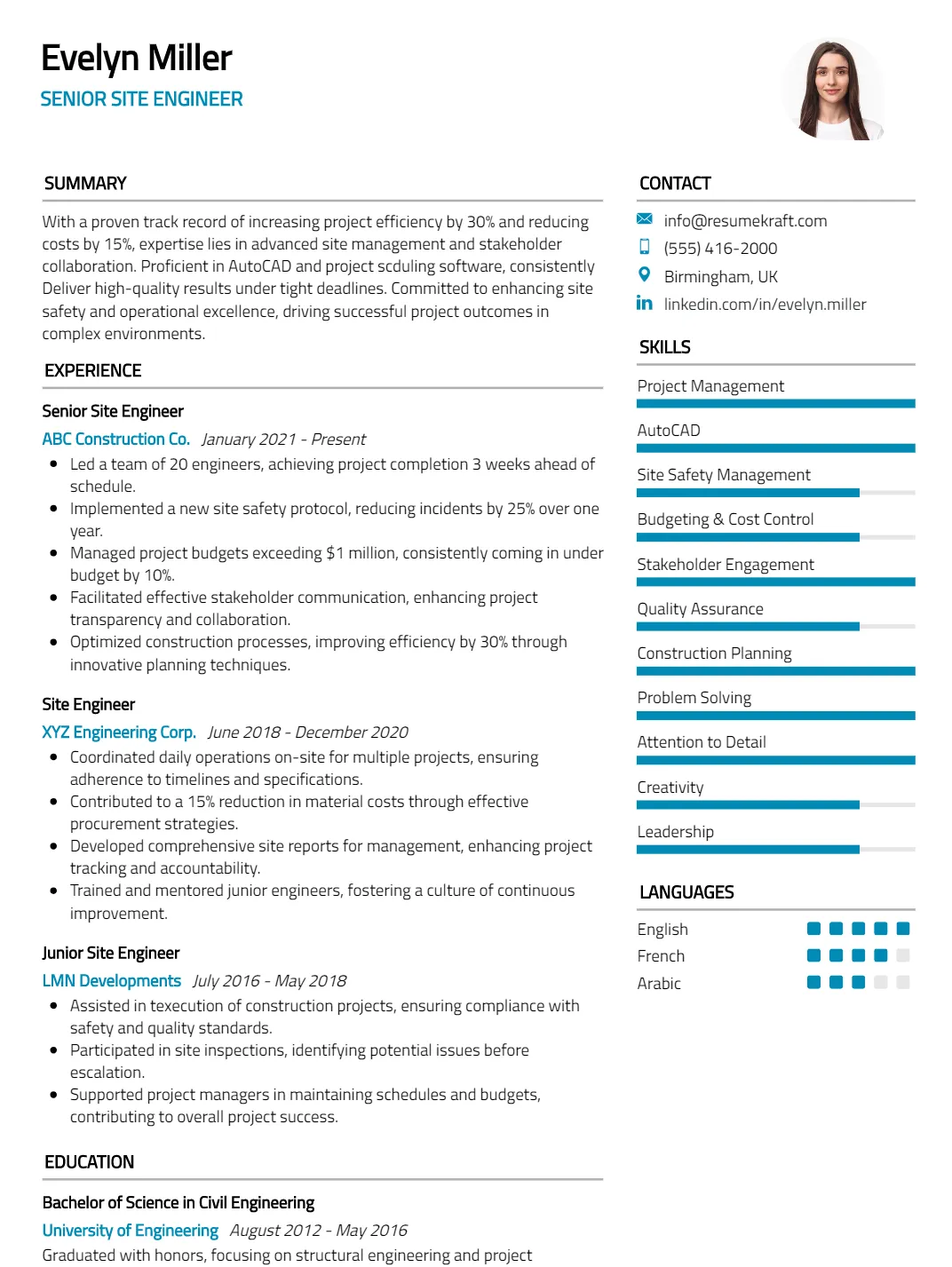
Why This Resume Works
This resume effectively positions the candidate for a Senior Site Engineer role by highlighting essential skills such as Project Management and Site Safety Management, which are critical in this field. The structured format clearly delineates eight years of progressive experience, showcasing relevant roles and responsibilities. Additionally, the inclusion of industry-specific keywords enhances ATS compatibility, ensuring visibility to hiring managers. Strategic presentation of achievements related to budget control and stakeholder engagement further underscores the candidate’s capacity to deliver successful projects on time and within budget.
Civil Site Engineer Resume

Why This Resume Works
This resume effectively positions the candidate for a Civil Site Engineer role by prominently showcasing essential skills like AutoCAD, project management, and safety compliance. With approximately six years of relevant experience, it highlights a progressive career path that aligns with industry expectations. The structured format ensures clarity, making it easy for hiring managers to assess qualifications. Additionally, the inclusion of keywords enhances ATS compatibility, while specific achievements demonstrate the candidate’s impact in previous roles, appealing directly to potential employers in this field.
Structural Engineer Specialist Resume
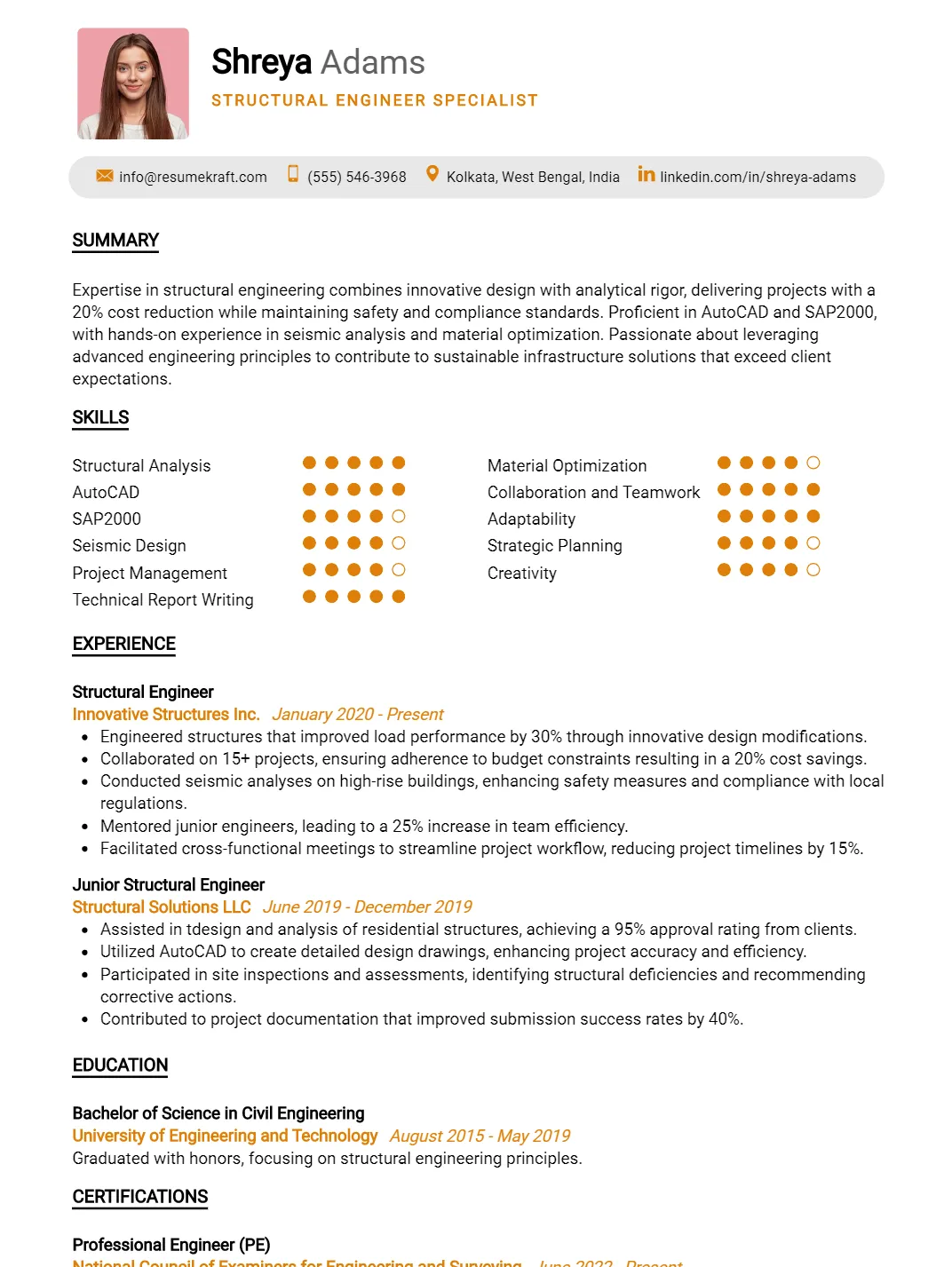
Why This Resume Works
This resume effectively showcases the candidate’s qualifications for the Structural Engineer Specialist position through a targeted list of key skills, including structural analysis and seismic design, which are vital for the role. It highlights approximately five years of relevant experience in progressively responsible positions, demonstrating growth and expertise. The clear format enhances readability and organization, catering to industry standards while ensuring ATS compatibility. Strategic presentation of achievements, such as successful project management outcomes, further emphasizes the candidate’s capability to excel in this specialized field.
Fields Site Engineer Resume
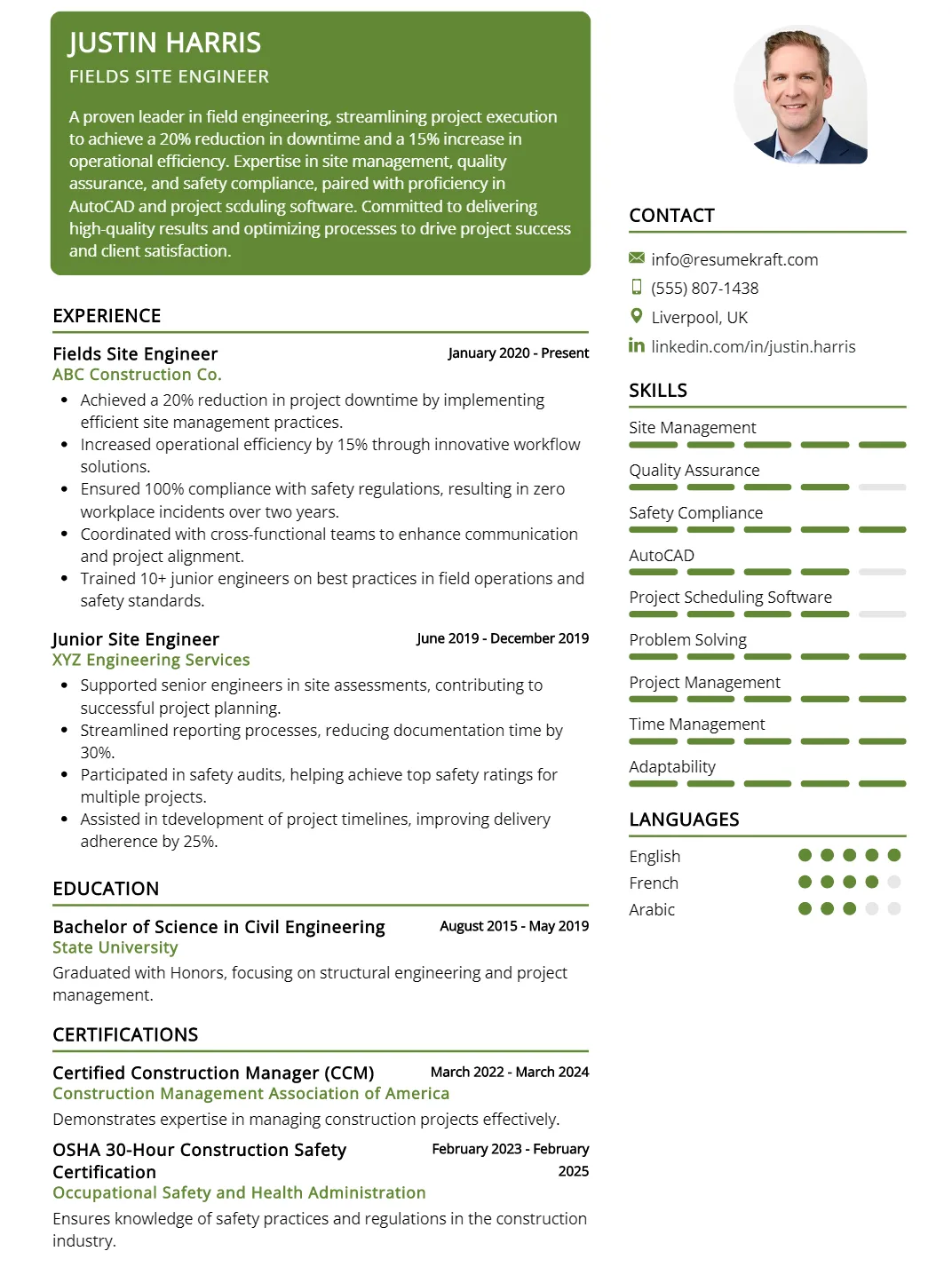
Why This Resume Works
This resume effectively positions the candidate for a Fields Site Engineer role by highlighting relevant skills such as site management, quality assurance, and safety compliance, which are crucial in this profession. With five years of experience as a Fields Site Engineer and Junior Site Engineer, it demonstrates a solid career progression. The structured format enhances readability, ensuring ATS compatibility through targeted keywords.
Geotechnical Site Engineer Resume
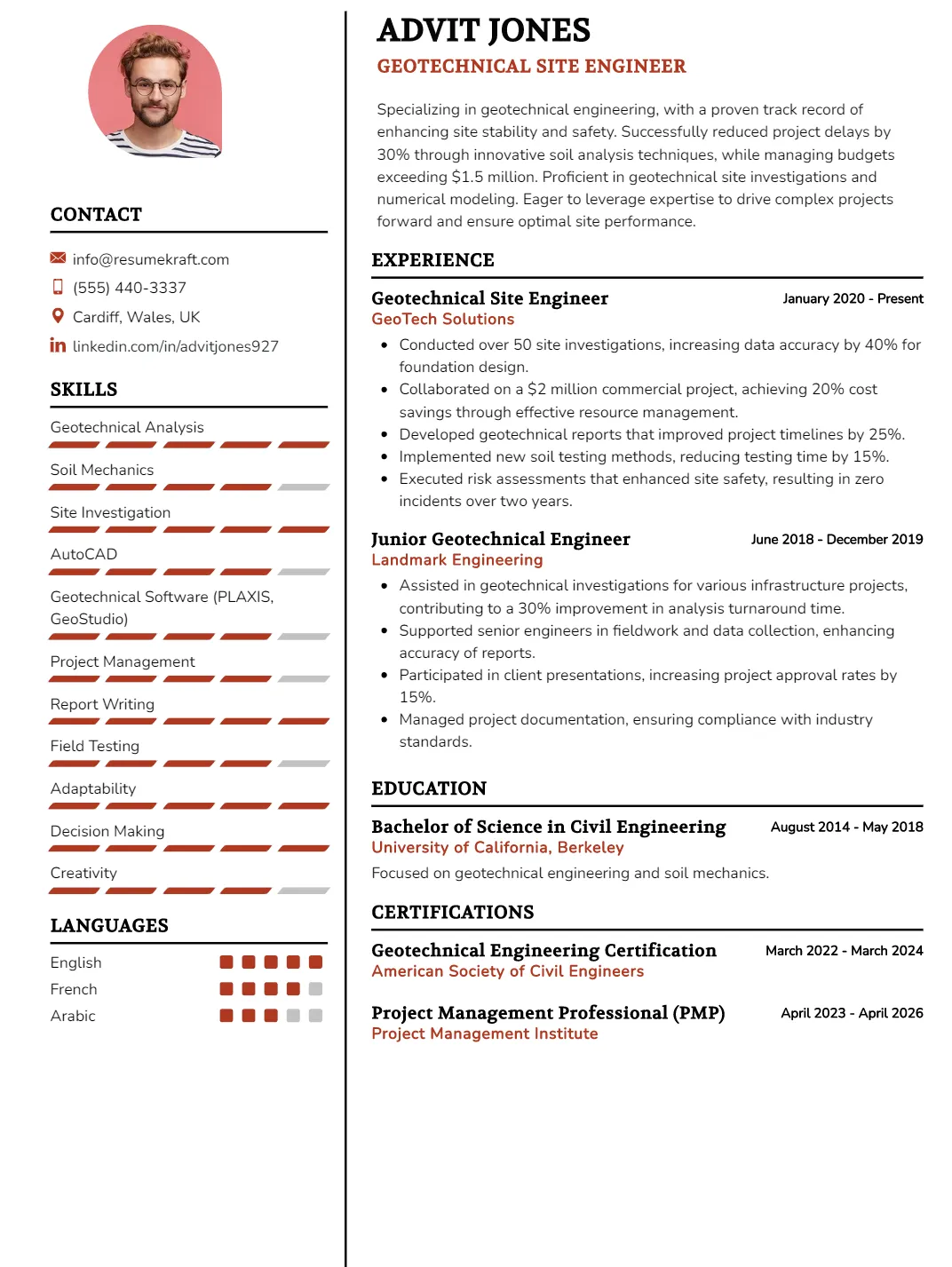
Why This Resume Works
This resume effectively highlights the candidate’s specialized skills and relevant experience for a Geotechnical Site Engineer position, showcasing expertise in geotechnical analysis and soil mechanics. The structured format presents key qualifications clearly, making it easy for hiring managers to identify competencies. Additionally, the use of industry-specific keywords ensures ATS compatibility, increasing visibility in applicant tracking systems. Strategic presentation of achievements—such as successful site investigations and proficiency with software like PLAXIS—demonstrates the candidate’s capability to excel in this role.
Senior Construction Site Engineer Resume
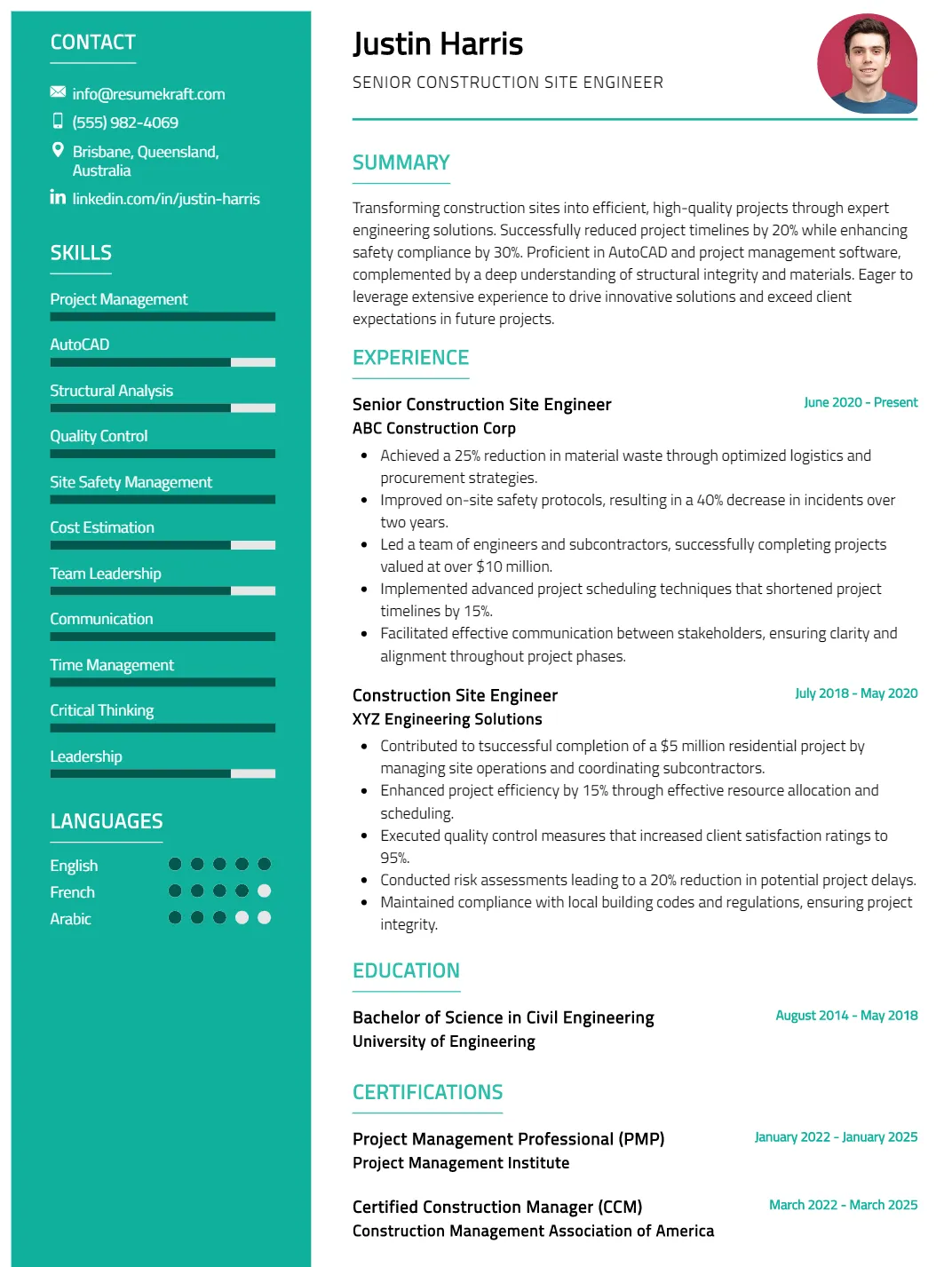
Why This Resume Works
This resume effectively highlights the candidate’s extensive experience as a Senior Construction Site Engineer, showcasing seven years in the field. The inclusion of key skills such as Project Management and Site Safety Management aligns perfectly with industry demands. Its structured format enhances readability, ensuring quick information retrieval for hiring managers. Additionally, the use of relevant keywords boosts ATS compatibility, increasing visibility to recruiters.
Construction Project Manager Resume
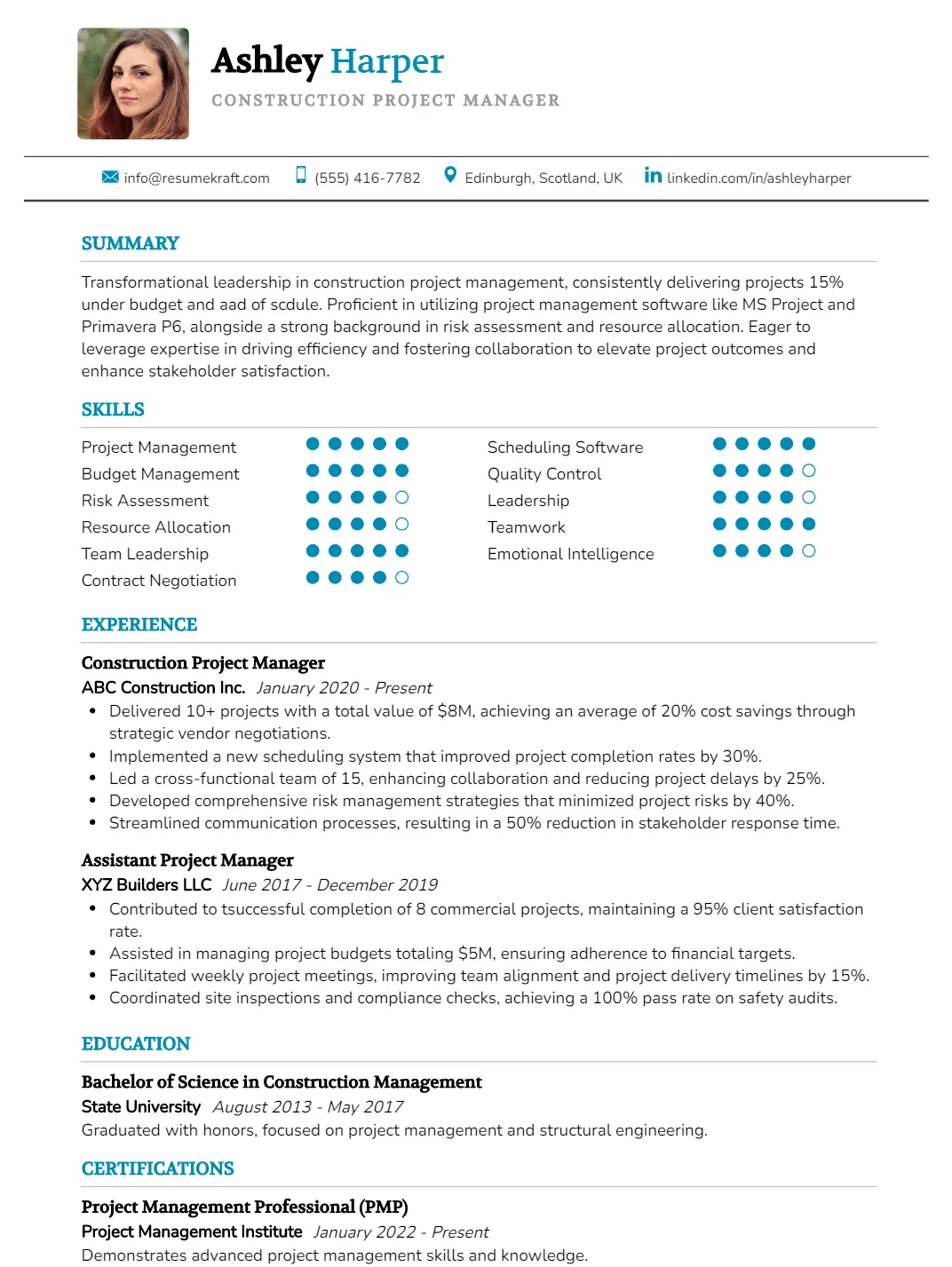
Why This Resume Works
This resume effectively showcases the candidate’s qualifications for a Construction Project Manager position by highlighting crucial skills such as Project Management and Budget Management. With approximately seven years of relevant experience, it emphasizes leadership capabilities and risk assessment expertise. The structured format enhances readability, making it easy for hiring managers to identify key information quickly. Additionally, the use of industry-specific keywords ensures ATS compatibility, while strategic presentation of achievements demonstrates measurable success in previous roles, aligning perfectly with employer expectations in construction management.
Resident Engineer Resume
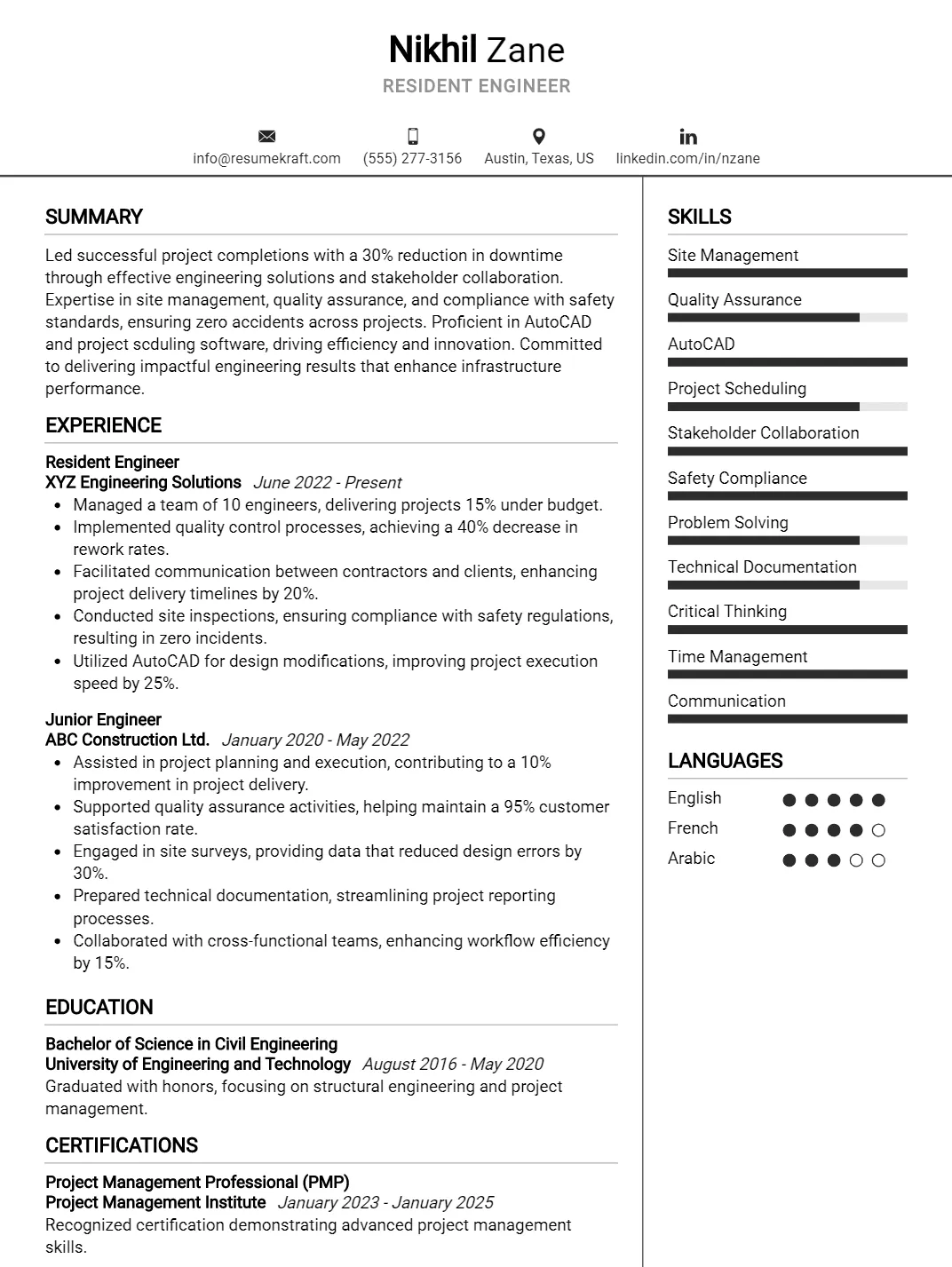
Why This Resume Works
This resume effectively positions the candidate for a Resident Engineer role by highlighting essential skills such as Site Management and Quality Assurance, directly relevant to the position. With approximately five years of progressive experience, the structured format showcases achievements in project scheduling and stakeholder collaboration, appealing to industry standards. The use of keywords ensures ATS compatibility, enhancing visibility in applicant tracking systems. Overall, this strategic presentation emphasizes both technical expertise and practical experience, making it highly suitable for the Resident Engineer position.
Project Site Supervisor Resume
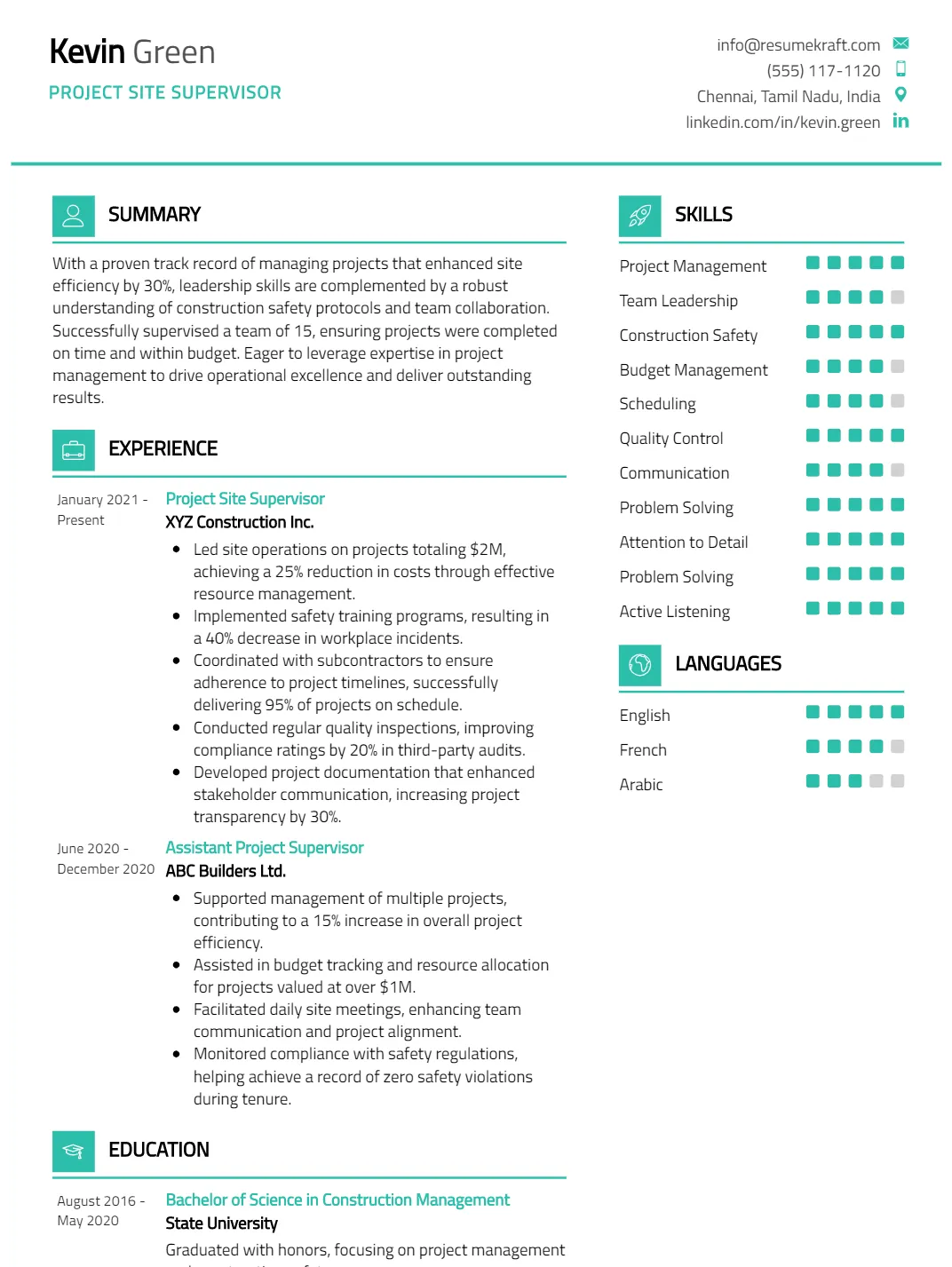
Why This Resume Works
This resume effectively positions the candidate for a Project Site Supervisor role by highlighting essential skills such as Project Management and Construction Safety, directly aligning with industry demands. The structured format allows for easy navigation, showcasing relevant experience as both a Project Site Supervisor and Assistant Project Supervisor over four years. Its ATS compatibility is ensured through the use of targeted keywords specific to the construction field.
Infrastructure Design Engineer Resume
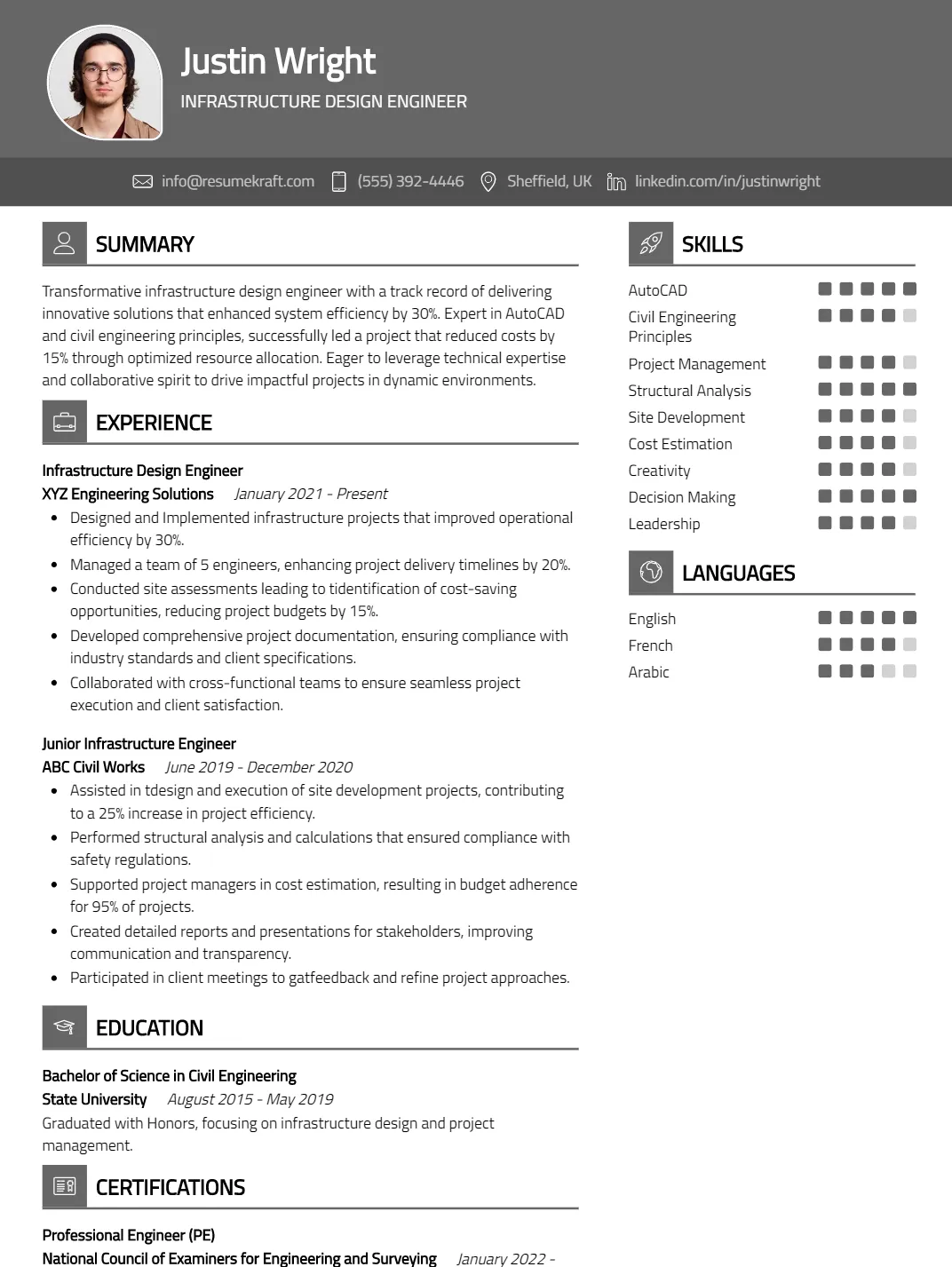
Why This Resume Works
This resume effectively highlights the candidate’s relevant skills, such as AutoCAD and project management, which are crucial for an Infrastructure Design Engineer. With five years of experience in both roles, it showcases a progressive career path, making the candidate stand out. The structured format ensures clarity and ease of reading, enhancing ATS compatibility with industry-specific keywords. Furthermore, the strategic presentation of achievements demonstrates tangible contributions to past projects, aligning perfectly with the expectations for this profession.
Senior Infrastructure Engineer Resume
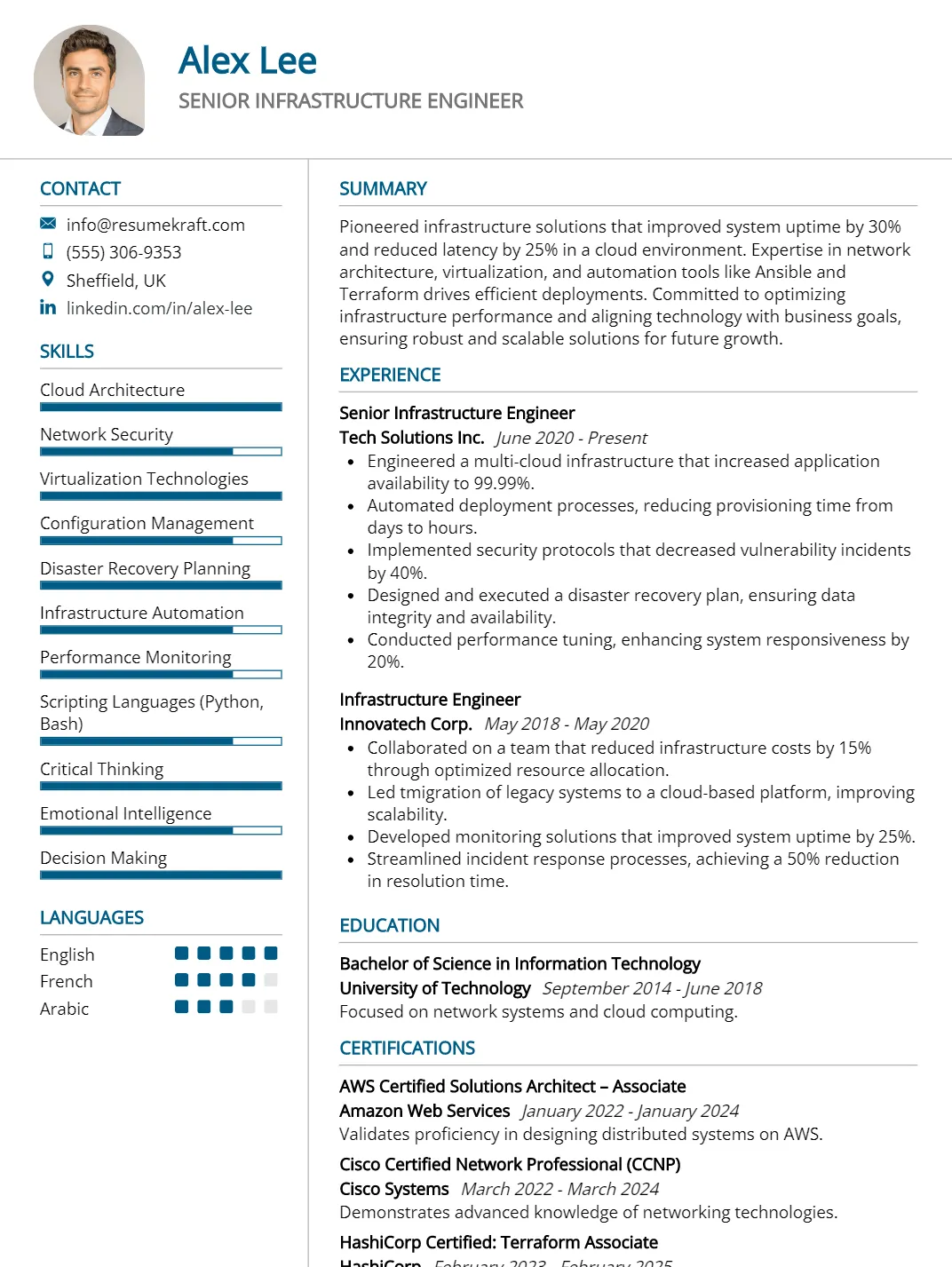
Why This Resume Works
This resume effectively highlights the candidate’s relevant skills in Cloud Architecture, Network Security, and Disaster Recovery Planning, aligning perfectly with the Senior Infrastructure Engineer position. The structured format emphasizes key experiences from approximately seven years in related roles, enhancing readability for hiring managers. Its ATS compatibility is ensured through targeted keywords matching industry standards. Additionally, the strategic presentation of achievements underscores the candidate’s impact in previous positions, showcasing their ability to drive infrastructure improvements essential for this role.
Site Engineering Director Resume
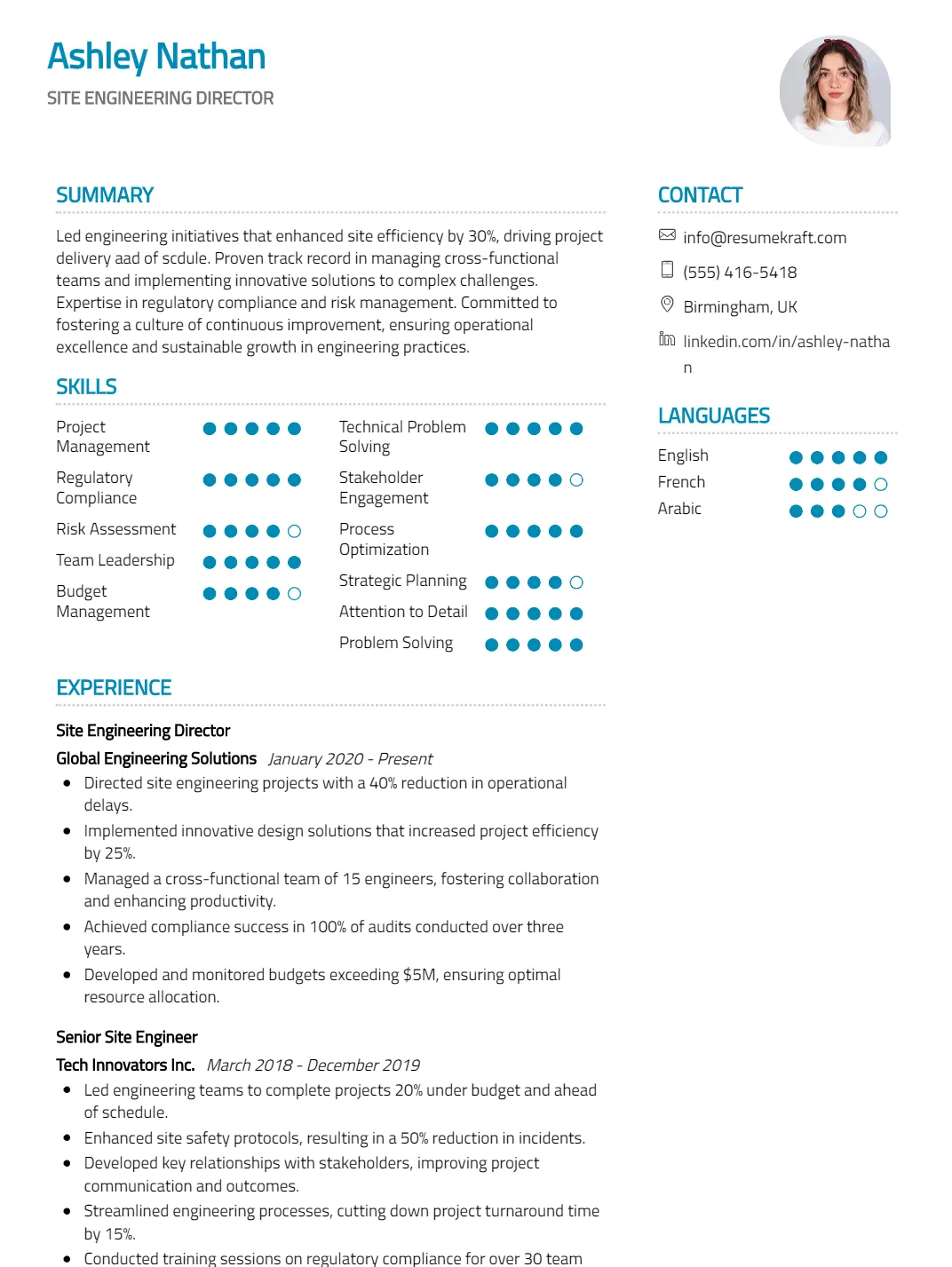
Why This Resume Works
This resume effectively positions the candidate for a Site Engineering Director role by highlighting key skills such as project management and regulatory compliance, which are crucial in this field. With nearly nine years of relevant experience, including progressive roles from Site Engineer to Director, it demonstrates depth and leadership capability. The structured format enhances readability, ensuring ATS compatibility through the use of industry-specific keywords. Additionally, the strategic presentation of achievements underscores successful budget management and risk assessment, showcasing the candidate’s impact in previous positions.
Environmental Site Engineer Resume
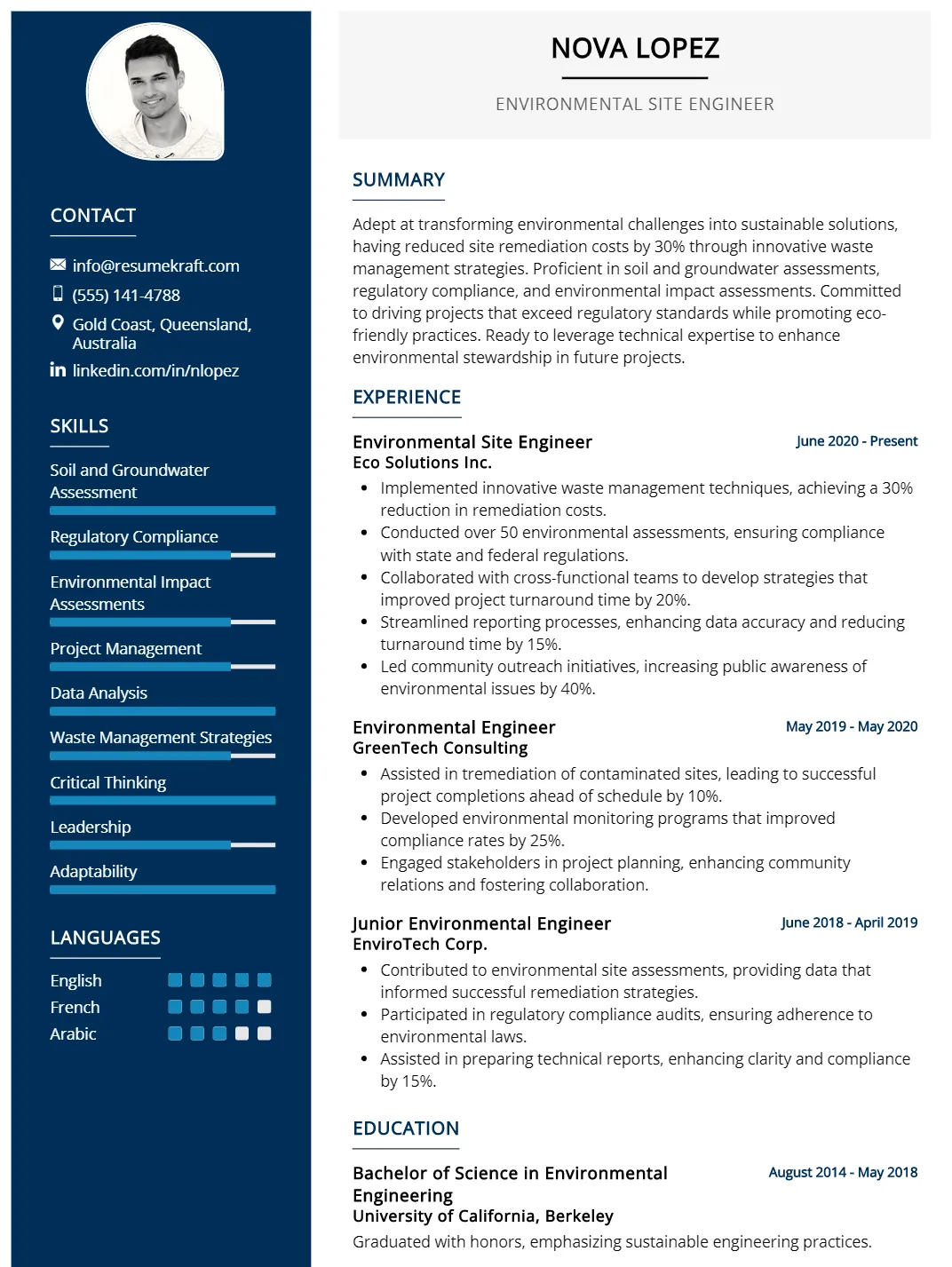
Why This Resume Works
This resume effectively positions the candidate for the Environmental Site Engineer role by showcasing relevant skills such as Soil and Groundwater Assessment and Regulatory Compliance, essential for industry success. The structured format highlights approximately seven years of progressive experience, enhancing readability for hiring managers. Its compatibility with ATS is ensured through keyword optimization related to environmental engineering. Additionally, strategic presentation of achievements in project management and data analysis underlines the candidate’s capability to deliver impactful results in environmental assessments, making it a compelling choice for.
Highway Site Engineer Resume
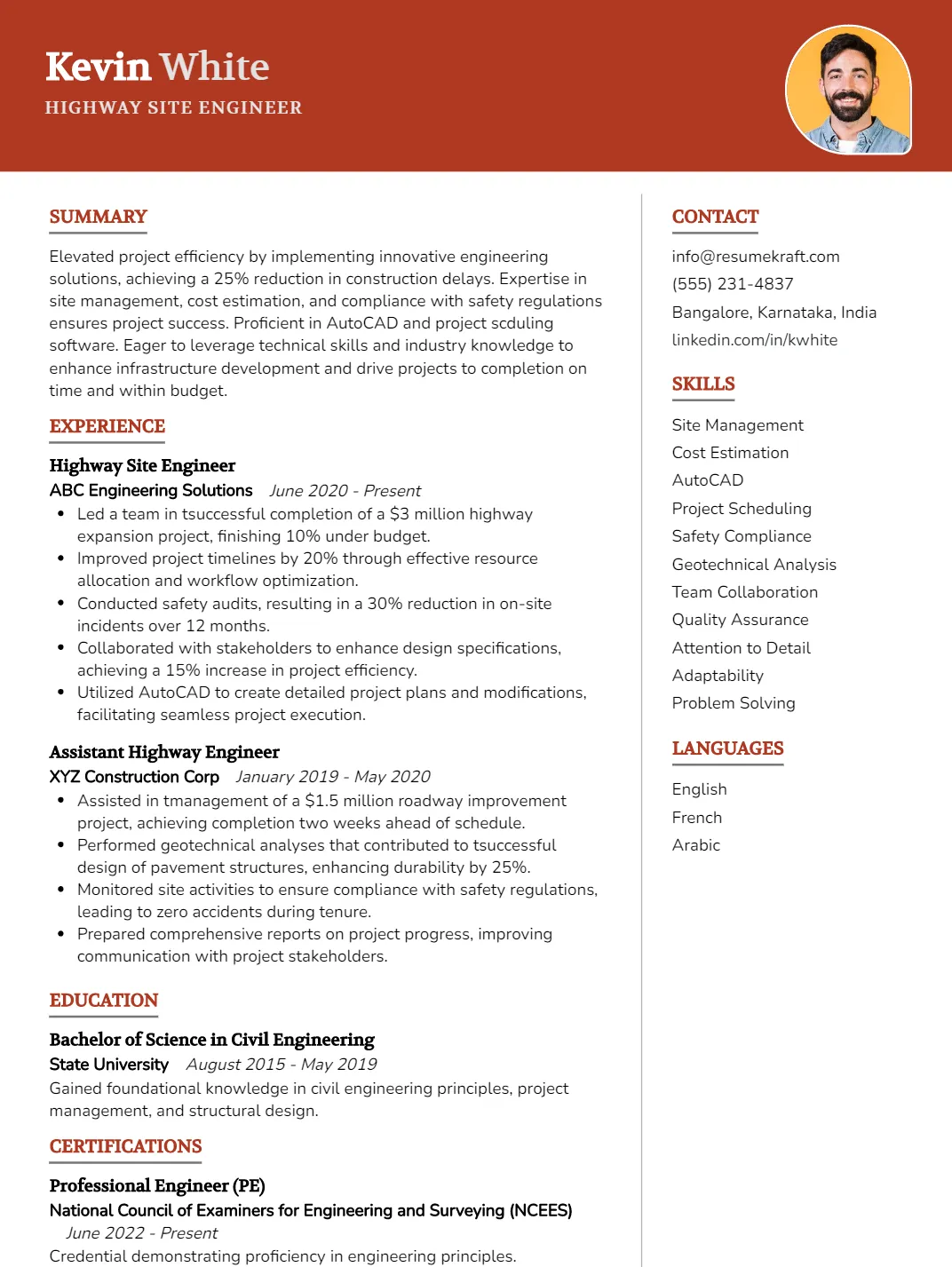
Why This Resume Works
This resume effectively positions the candidate for a Highway Site Engineer role by highlighting relevant skills such as Site Management, Cost Estimation, and AutoCAD proficiency. With approximately six years of targeted experience, it showcases a clear career progression from Assistant Highway Engineer to Highway Site Engineer. The structured format emphasizes key qualifications and achievements that align with industry standards, ensuring ATS compatibility. Additionally, strategic presentation of accomplishments in project scheduling and safety compliance addresses critical requirements for successful performance in highway engineering projects.
Marine Site Engineer Resume
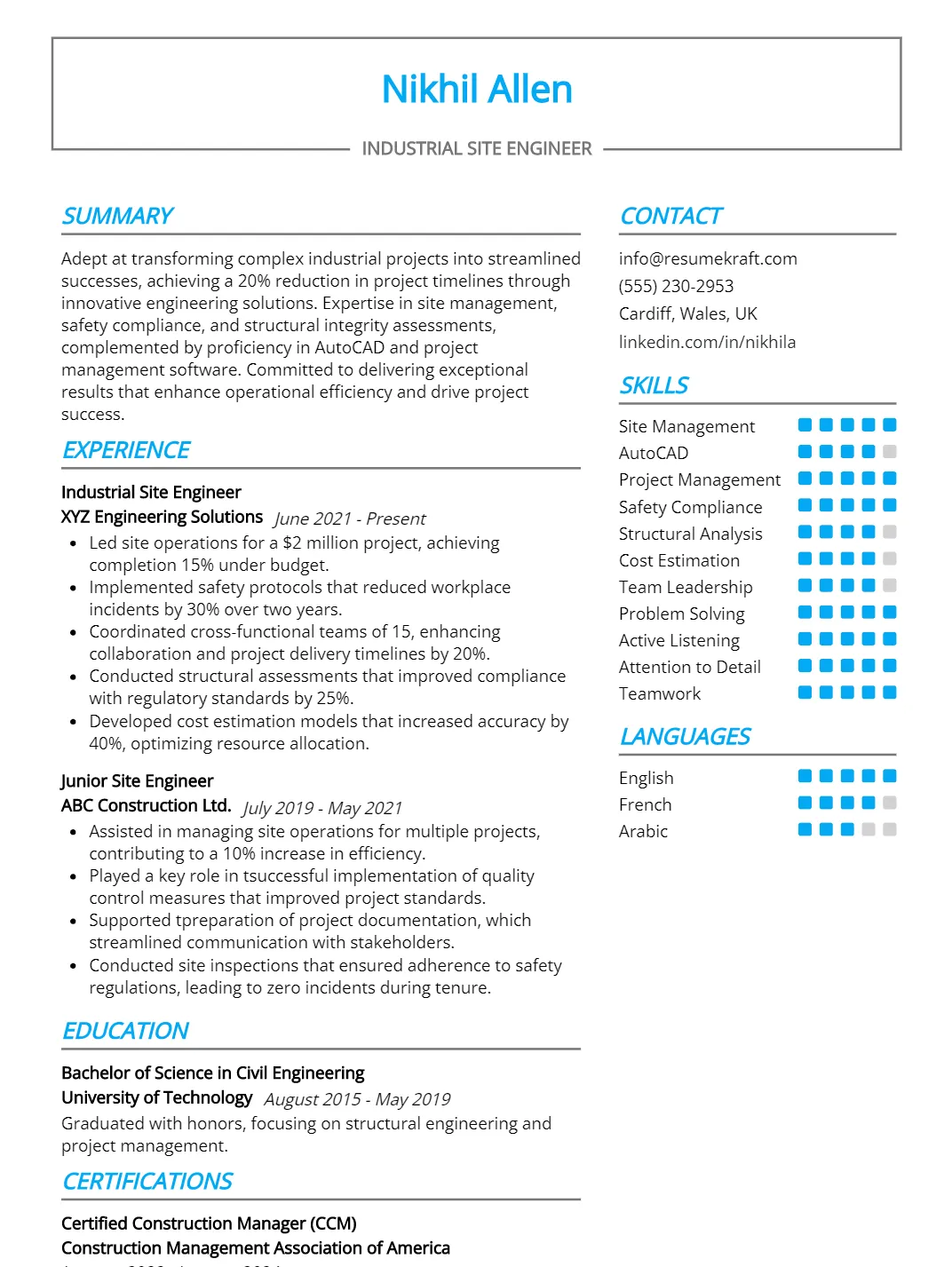
Why This Resume Works
This resume effectively highlights the candidate’s relevant skills and experience for the Industrial Site Engineer position, showcasing expertise in site management, AutoCAD, and safety compliance. The clear structure allows for easy navigation, emphasizing key accomplishments that demonstrate leadership and project success. Additionally, its use of industry-specific keywords enhances ATS compatibility, ensuring it stands out during digital screenings. By strategically presenting achievements related to structural analysis and project management, the resume aligns well with the requirements of the role, making a compelling case for the candidate’s.
Renewable Energy Site Engineer Resume
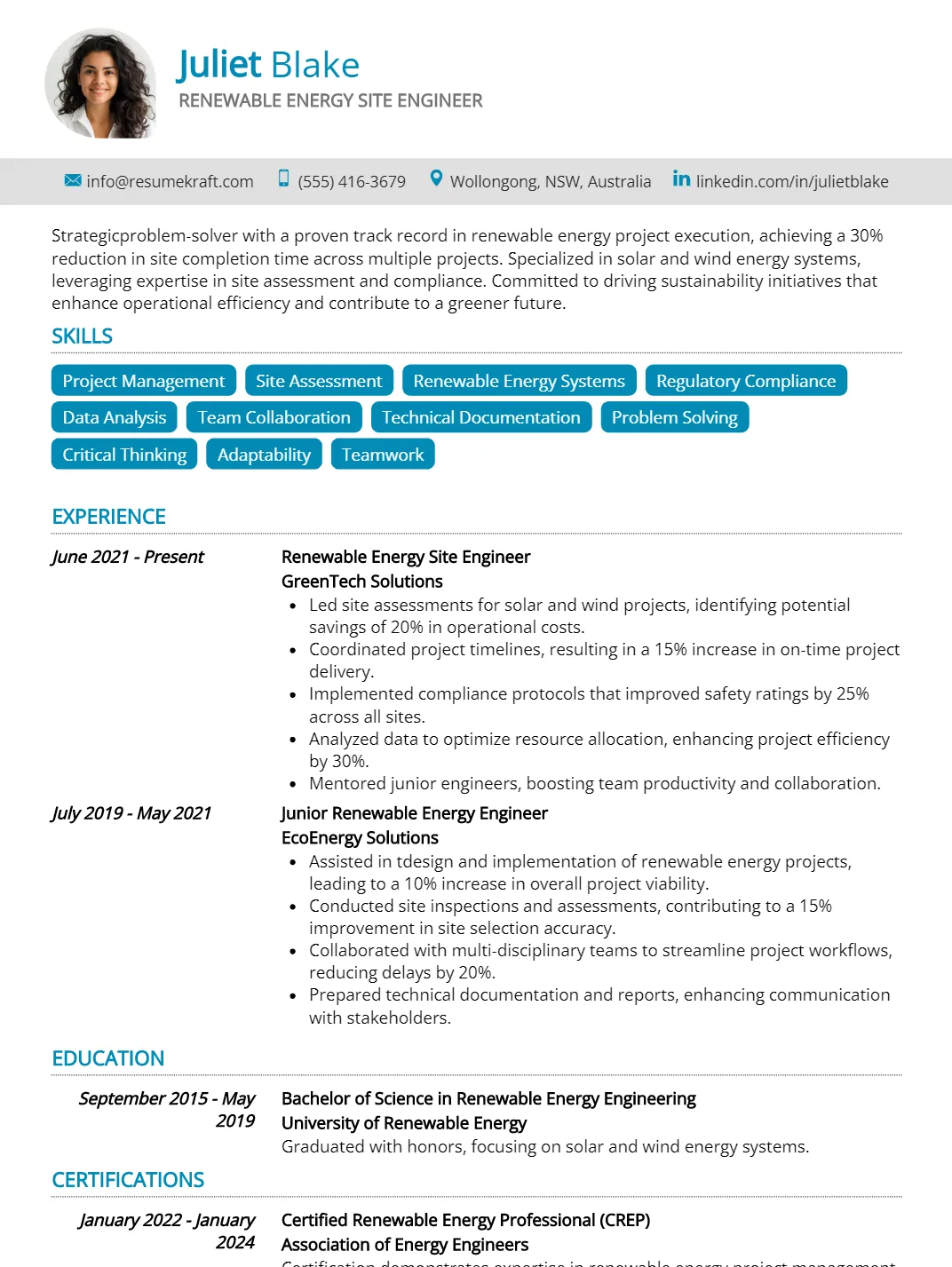
Why This Resume Works
This resume effectively highlights the candidate’s relevant skills and experience for a Renewable Energy Site Engineer position, showcasing expertise in project management, site assessment, and renewable energy systems. The structured format enhances readability, emphasizing key accomplishments that demonstrate compliance with industry regulations and data analysis proficiency. Designed to be ATS-compatible, it incorporates specific keywords pertinent to the field, ensuring visibility in applicant tracking systems. Overall, the strategic presentation of achievements aligns perfectly with the expectations of employers in the renewable energy sector.
How to format a Site Engineer resume
Proper formatting is crucial for a Site Engineer resume as it enhances readability and highlights your key skills and experiences effectively. A clear and professional resume format can make a significant difference in catching the attention of hiring managers.
- Use a clean, professional font like Arial or Times New Roman, sized between 10-12 points. This ensures readability and maintains a professional appearance throughout your resume.
- Organize your resume into distinct sections such as Summary, Experience, Education, and Skills. This structure allows potential employers to quickly find relevant information about your qualifications.
- Utilize bullet points for listing achievements and responsibilities in your work experience. This makes it easier to scan your resume and emphasizes key accomplishments that showcase your expertise.
- Keep margins consistent, ideally between 0.5 to 1 inch, to create a balanced layout. A well-spaced resume avoids clutter and helps guide the reader’s eye through your qualifications.
- Highlight relevant certifications and licenses in a dedicated section, particularly those specific to site engineering, as they demonstrate your qualifications and commitment to professional development in the field.
How to write your Site Engineer resume experience
Effectively presenting work experience on a Site Engineer resume is crucial as it showcases your hands-on expertise and ability to manage construction projects. Employers are looking for specific details that illustrate your technical skills, problem-solving capabilities, and contributions to successful project outcomes. A well-crafted experience section can differentiate you from other candidates by demonstrating not only what you did but also the impact of your work.
A strong experience section should highlight quantifiable achievements and relevant responsibilities that align with the job requirements. This approach helps employers visualize your potential value to their team and assess your fit for the role based on past performance.
Worked on various construction projects, focusing on site management and engineering tasks.
Supervised a team of 10 on a $3M commercial building project, achieving 100% compliance with safety regulations and completing the project 2 weeks ahead of schedule.
How to list your hard skills and soft skills on your resume
In the competitive field of site engineering, a well-crafted resume must effectively showcase both hard and soft skills. Hard skills demonstrate your technical expertise and knowledge of engineering principles, while soft skills reveal your ability to communicate, collaborate, and adapt in a team-oriented environment. A balance of both types of skills is crucial, as employers seek candidates who not only possess the necessary technical abilities but can also work effectively with diverse teams and stakeholders on-site.
Hard Skills:
- Project Management: Proficient in planning, executing, and overseeing construction projects.
- Civil Engineering Principles: Strong understanding of design and construction methods.
- AutoCAD: Skilled in using AutoCAD software for drafting and design.
- Site Surveying: Experience in conducting topographic surveys and site assessments.
- Construction Materials: Knowledge of various materials and their properties.
- Building Codes: Familiar with local and national building regulations and codes.
- Quality Control: Implementing quality assurance processes on-site.
- Cost Estimation: Ability to estimate project costs accurately based on specifications.
- Safety Protocols: Knowledge of safety standards and practices in construction.
- Structural Analysis: Capability to analyze and assess structural integrity.
- Scheduling Software: Proficient in using tools like Microsoft Project for scheduling.
- Environmental Regulations: Understanding of environmental impact assessments.
- Contract Management: Experience in managing contracts and procurement processes.
- GIS Software: Familiarity with Geographic Information Systems for mapping and analysis.
- Site Management: Expertise in overseeing daily operations and crew management.
Soft Skills:
- Communication: Strong verbal and written communication skills for effective collaboration.
- Teamwork: Ability to work collaboratively with diverse teams to achieve project goals.
- Problem-Solving: Proficient in identifying issues and implementing effective solutions.
- Leadership: Experience in guiding and motivating team members on-site.
- Time Management: Capable of prioritizing tasks to meet project deadlines.
- Adaptability: Flexibility to adjust to changing project requirements and conditions.
- Attention to Detail: Meticulous in ensuring accuracy and quality in work.
- Negotiation: Skilled in negotiating with contractors and suppliers.
- Conflict Resolution: Ability to mediate and resolve disputes among team members.
- Critical Thinking: Proficient in analyzing situations and making informed decisions.
- Customer Service: Committed to meeting client needs and expectations.
- Organization: Strong organizational skills for managing multiple tasks effectively.
- Creativity: Innovative in finding new approaches to engineering challenges.
- Dependability: Reliable in fulfilling responsibilities and commitments.
- Empathy: Understanding of team dynamics and the ability to support colleagues.
- Self-Motivation: Driven to achieve personal and project-related goals independently.
How to list your certifications and education on your resume
When presenting certifications and education on a Site Engineer resume, it’s essential to highlight qualifications that directly relate to civil engineering or construction management. Relevant degrees include a Bachelor’s or Master’s in Civil Engineering, Construction Management, or a related field. Additionally, industry-recognized certifications such as PMP, LEED, or similar can significantly enhance your candidacy by demonstrating your commitment to professional development and expertise in project management.
Focus on structuring this information clearly and concisely, listing the degree or certification, the institution, and the year of completion. This approach ensures that hiring managers can quickly assess your qualifications and relevance to the role.
Went to college for engineering and got several certificates related to construction. I have some certifications but not sure of the details.
Bachelor of Science in Civil Engineering, ABC University, 2020. Certified Project Management Professional (PMP), 2021. LEED Green Associate, 2022.
How to write your Site Engineer resume summary or objective
A strong resume summary or objective is crucial for a Site Engineer position as it provides a snapshot of your qualifications and career goals, capturing the attention of hiring managers quickly. A summary is often preferred by those with experience, highlighting key achievements and skills, while an objective is suitable for entry-level candidates, focusing on aspirations and how they align with the company’s goals.
Seeking a position in site engineering to use my skills and gain experience. I am a hard worker and can work well in a team.
Detail-oriented Site Engineer with 5+ years of experience in managing construction projects, ensuring safety compliance, and delivering results on time. Eager to leverage expertise in project coordination and team leadership at XYZ Construction.
Additional sections for a Site Engineer resume
Including additional sections in a Site Engineer resume can significantly enhance its effectiveness by showcasing relevant skills, experiences, and qualifications that may not fit neatly into standard categories. These sections can provide a competitive edge and highlight unique aspects of your professional profile.
- Certifications: Listing relevant certifications, such as PMP or OSHA, can demonstrate your commitment to professional development and adherence to industry standards, making you more appealing to potential employers.
- Technical Skills: Highlighting specific software and tools you are proficient in, like AutoCAD or Civil 3D, showcases your technical capabilities and readiness to tackle complex engineering tasks on site.
- Project Highlights: Including brief summaries of key projects you’ve worked on can illustrate your hands-on experience and successful outcomes, helping potential employers visualize your contributions and expertise.
- Professional Affiliations: Mentioning memberships in organizations like the American Society of Civil Engineers (ASCE) can enhance your credibility, showing your engagement with the industry and access to valuable networking opportunities.
- Volunteer Experience: Including relevant volunteer work demonstrates your commitment to community and teamwork, as well as your ability to apply engineering skills in diverse situations, which can be attractive to employers.
Key takeaways for writing a professional Site Engineer resume
- Highlight relevant technical skills, such as project management, site safety protocols, and construction methodologies, ensuring they align with job descriptions for maximum impact.
- Use specific metrics to demonstrate your achievements, like project completion times and budget adherence, to quantify your contributions effectively.
- Consider utilizing resume templates tailored for engineering roles to streamline your formatting and ensure a professional appearance that captures attention.
- Incorporate keywords from the job posting to help your resume pass through Applicant Tracking Systems (ATS) and increase your chances of being noticed by employers.
- Leverage an ai resume builder to create a polished and tailored resume quickly, focusing on your experience and skills relevant to site engineering.
Frequently Asked Questions
How long should my Site Engineer resume be?
Your Site Engineer resume should ideally be one page long, especially if you have less than 10 years of experience. This length allows you to effectively showcase your skills and achievements without overwhelming the reader. However, if you have extensive experience or numerous projects, you may extend it to two pages, ensuring every detail enhances your candidacy. Focus on clarity and conciseness to make a strong impact within the limited space.
What is the best format for a Site Engineer resume?
The best format for a Site Engineer resume is the reverse chronological format. This structure highlights your most recent experience at the top, making it easy for potential employers to see your latest accomplishments first. Use clear headings for each section, such as Work Experience, Education, and Skills. Additionally, consider incorporating bullet points for clarity, and ensure consistent formatting for a professional appearance that enhances readability.
What should I highlight on my Site Engineer resume to stand out?
To stand out as a Site Engineer, highlight your technical skills, project management experience, and any specialized certifications, such as PMP or relevant engineering licenses. Emphasize your ability to collaborate with multidisciplinary teams and your success in delivering projects on time and within budget. Also, showcase any innovative solutions you implemented or challenges you overcame, as these demonstrate your problem-solving abilities and commitment to excellence in engineering practices.
What are some ways to quantify my experience on my Site Engineer resume?
Quantifying your experience on a Site Engineer resume can significantly enhance your credibility. Use metrics such as the number of projects completed, budget sizes managed, or percentage improvements in efficiency or safety. For instance, stating that you managed a $2M project that was delivered 10% under budget showcases your financial acumen. Additionally, mention specific outcomes, like reducing waste by 15% or improving project timelines by 20%, to illustrate your impact on previous projects.

